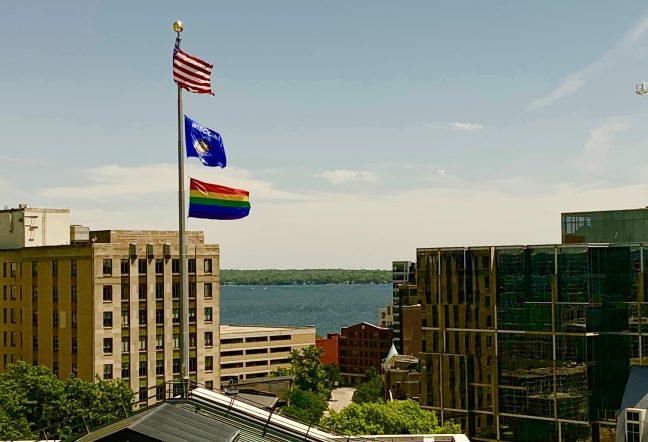This June, three flags flew above Wisconsin State Capitol — the American flag, the flag of Wisconsin and, for the first time in the state’s history, the rainbow-colored pride flag.
The pride flag was joined by rainbow banners above municipal buildings, thanks to order from Satya Rhodes-Conway, Madison’s first openly gay mayor.
While the raising of the flag was met with broad support, with residents gathering to watch and applaud the event, it wasn’t entirely without controversy. Rep. Scott Allen, R-Racine, decried the flag-raising as “divisive,” comparing it to raising a religious symbol over the state’s capitol.
The bulk Allen’s statement clarifying his opposition is tooth-gnashing over the state’s executive being “offensive to those who hold beliefs contrary to what that banner symbolizes,” and an empty to appeal to impossible unanimity which could be used to oppose any expression of conviction or belief from government in any form. But there is a passage in the statement that provokes productive thought.
“Flags are symbols,” Allen writes. “When raised over military fortifications and sometimes over government buildings, they symbolize victory.”
The state which, in the 1950s, elected Sen. Joe McCarthy, an architect of the “Lavender Scare” campaign to force gay civil servants out of the government, elected Sen. Tammy Baldwin in 2012, the nation’s first openly gay senator.
In living memory, the LGBTQ community has endured entrapment and abuse by police around the country. Now the community debates responses to police officers seeking to join pride parades.
Compared to the nation’s recent past, and to countries around the world where homosexuality is a criminal and sometimes capital offense, the American LGBTQ community enjoys unprecedented power and acceptance. Is this a declaration of victory? When your flag flies over the state’s capitol, and when four years ago the nation’s seat of power was lit up in rainbow colors, which way is forward?
Law enforcement looks to mend relationships with LGBTQ+ community after being uninvited from Pride
To the Scott Allens of the world, LGBTQ activists have become bullying hecklers who, having secured their legal rights, now seek to stamp out every florist and cake shop owner who reads the Bible differently than them. This is rooted in misunderstanding — a willful refusal to see how a court that sides with a discriminatory cake-froster today would side with discrimination in the far more essential sectors of employment, housing and healthcare tomorrow.
The truth is, we have a long road ahead of us in the pursuit of equality. Currently, 17 states have no employment protections whatsoever for LGBTQ people. While gay and lesbian Americans can serve in the military, transgender Americans are being barred from serving their country.
Recognition of transgender rights, broadening access to the healthcare of transition for all who might need it, and providing a place in the public square for the recognition and respect of non-binary identities, are all worthy struggles deserving the same passion that activists showed when crusading for marriage equality.
Likewise, when a man who compared legalizing homosexuality to legalizing beastiality sits on Wisconsin’s Supreme Court with the majority, it is entirely appropriate for the LGBTQ community to fear for the progress it has made. History and hate have momentum, and present gains do not erase past crimes. What the LGBTQ community has today was bought with pain and effort, and it would disrespect the work of those who came before to take what they won for granted.
This does not mean that the raising of the Pride Flag above Wisconsin was an empty gesture in the face of the bitter work ahead. The American flag that flew above it also does not symbolize a finished fight. Two and a half centuries after American Revolution, the banner represents not only the Republic’s victory against monarchy, but the pain and strife of a nation that endured civil war to end the buying and selling of human beings, that bled in Europe and the Pacific when fascism threatened to snuff out the fire of democracy, that only after the bravery and brutalization of activists recognized the votes of women and people of color.
The flag of America represents the ongoing struggle to, as put in the Constitution’s Preamble, “secure the blessings of liberty for ourselves and our posterity.”
The raising of the pride flag alongside that historic banner is a recognition of the LGBTQ community’s own struggle. There will be no final end in the battle for every person to live their truth in dignity, to light the world by loving freely and openly.
There will be no perfect security for liberty’s blessings. Our victory is each child who lives with, as Franklin Delano Roosevelt put in his vision for global rights, “freedom from fear,” who can come to terms with themselves at peace and in safety. Our victory is not utopia, it is simply leaving the world more loving than we found it.
If it can be said that we have, even in part, achieved that, then it was right to raise the flag and let it fly. Each person who sees it, and remembers that they are stronger than they know, too, is a victory.
Ethan Carpenter ([email protected]) is a junior majoring in political science.














